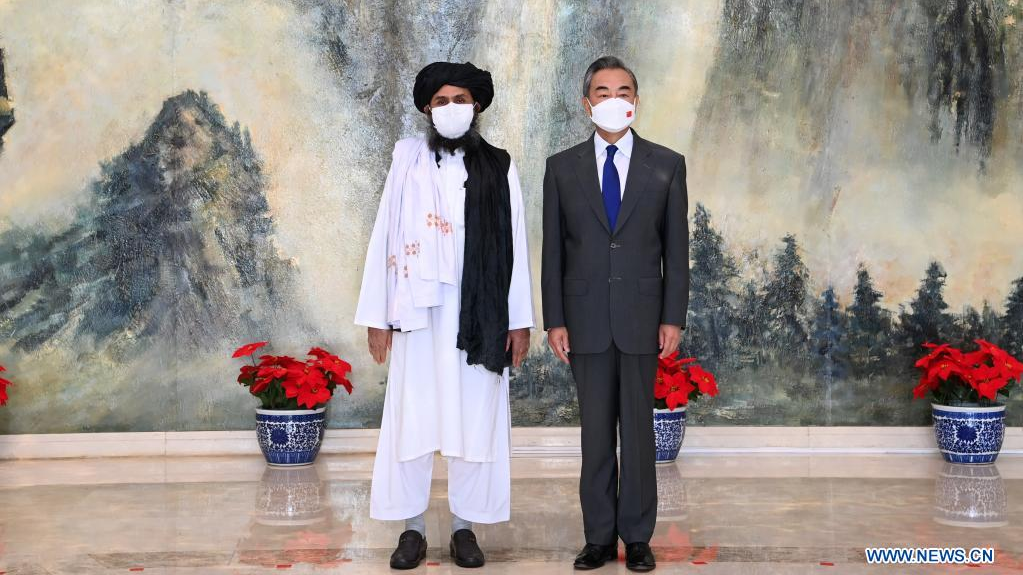
Chinese State Councilor and Foreign Minister Wang Yi meets with Mullah Abdul Ghani Baradar, political chief of Afghanistan's Taliban, in north China's Tianjin, July 28, 2021. /Xinhua
Chinese State Councilor and Foreign Minister Wang Yi meets with Mullah Abdul Ghani Baradar, political chief of Afghanistan's Taliban, in north China's Tianjin, July 28, 2021. /Xinhua
Editor's note: Bobby Naderi is a London-based journalist, guest contributor in print, radio and television, and documentary filmmaker. The article reflects the author's opinions, and not necessarily the views of CGTN.
On July 28, a Taliban delegation visited China. During the talks, Beijing said the group will play an important role in the intra-Afghan peace process, as well as reconciliation and reconstruction efforts. This comes as the Taliban is making territorial gains against the Afghan government and as the U.S. continues to step up airstrikes against the group.
All military matters aside, China has an interest in a stable Afghanistan and wants to invest in its neighbor's infrastructure projects and reconstruction, provided the Taliban adheres to international norms and severs ties with the East Turkistan Islamic Movement, a militant group that Beijing accuses of being behind terrorist attacks in the Xinjiang Uygur Autonomous Region.
China wants to complete the Belt and Road Initiative (BRI), which includes the construction of a road and rail transportation network that stretches from western China to Germany crossing dozens of countries. Afghanistan, rich in minerals, is a critical part of that network. China also wants to build a north-south economic corridor that would carry energy from the Persian Gulf to its border in the north. Nothing will happen until America's endless war and the Taliban insurgencies come to an end.
Whatever the truth of the matter, cooperation in diplomacy is destined to give results because, unlike the U.S. and its interventionist Pentagon generals, China respects Afghanistan's sovereign independence and territorial integrity and adheres to non-interference in its internal affairs. It reveals the inevitable failure of Washington's colonial policies and offers the Afghan people an important opportunity to stabilize and develop their country with help from Beijing and others.
The plan du jour
Almost 20 years and counting, not a single one of the thousands of homes and roads destroyed by the U.S.-led invasion has been rebuilt in Afghanistan. The war-torn country is still grieving the loss of thousands of innocent civilians, including women and children. There are thousands of undetonated bombs and shells that pose a threat to anyone unlucky enough to stumble across them in rural areas.

Afghan militiamen join Afghan defense and security forces during a gathering in Kabul, Afghanistan, June 23, 2021. /CFP
Afghan militiamen join Afghan defense and security forces during a gathering in Kabul, Afghanistan, June 23, 2021. /CFP
Most of the millions of Afghans displaced by America's longest war continue to live in other countries or makeshift shelters, often in the rubble of their former homes and communities littered with apocalyptic decay where houses, shops, and restaurants once stood. What's worse, there is no electricity, water, food, health care, justice, and jobs in many areas.
The "right war" was sold to the global community as a political campaign to reconstruct Afghanistan and thereby establish the authority of a democratic central government. The campaign by private war profiteers was supposed to result in a reconstructed, peaceful, stable, democratically governed Afghanistan. It was nothing but a gambit to set up permanent bases in Afghanistan and occupy the country forever.
Under the circumstances, expect nothing to change significantly on President Joe Biden's watch. He might be drawing down U.S. forces, but he won't clean the corrupt system he has inherited, much less say a significant word about the magnitude of the failure of American plan du jour and "development" aid to a landlocked country as poor as Afghanistan.
Making a big difference
Those who skimp on aid and hand it over to for-profit contractors with strings attached, or enrich only the privateers and serve private interests, are deemed incapable of rebuilding Afghanistan. It calls for recruiting and financing dedicated international contractors and experts, including qualified companies and investors from China. Surely, they have no self-serving and self-defeating policies, and certainly no peculiar features of American development aid limited only to reviving a status quo at huge cost.
With help from China, however, Afghanistan can find its own light. When added to the work of others, China can do a better job. No matter how discouraging or harrowing it may be, Afghanistan can be limited only by what it allows itself to be limited by: imperial reconstruction and its discontent. When it becomes self-aware of this, the end of wartime destruction and the beginning of reconstruction aid is possible.
Afghans don't have to play by American rules or believe its repeatedly broken reconstruction promises and pointedly self-serving vanity projects. In many areas, the task of nationwide work can be entrusted to a BRI reconstruction mechanism, an agreement between authorities in Beijing and Kabul, which would oversee nearly every aspect of stabilizing and developing the landlocked country.
Here is the bottom line: China knows how to spend its resources on what's important to it in general and to its neighbors in particular. Such is the way of the world's second-largest economy. Indeed, in the absence of China, reconstruction in Afghanistan may become a hopeless shuck.
While American private contractors may no longer be in it even for the duration, Chinese investors and experts will always stay on the job to ensure the reconstruction aid they contracted to deliver reaches Afghans and benefits their communities.
(If you want to contribute and have specific expertise, please contact us at opinions@cgtn.com.)

